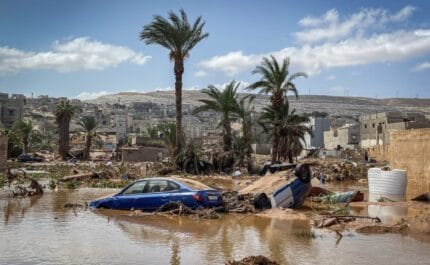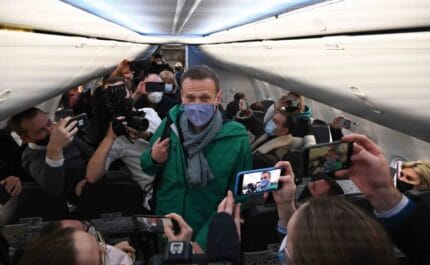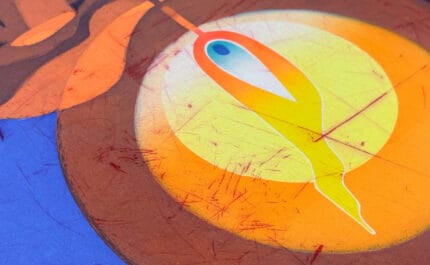Eleven days in May: 1. The Sheikh Jarrah evictions
On 20th May 2021 a ceasefire was agreed between Hamas and Israel, marking the end of an 11-day war that cost hundreds of lives. We spoke to three Palestinians and three Israelis about the brief and bloody conflict to see why it arose, how the fighting unfolded and what happened next
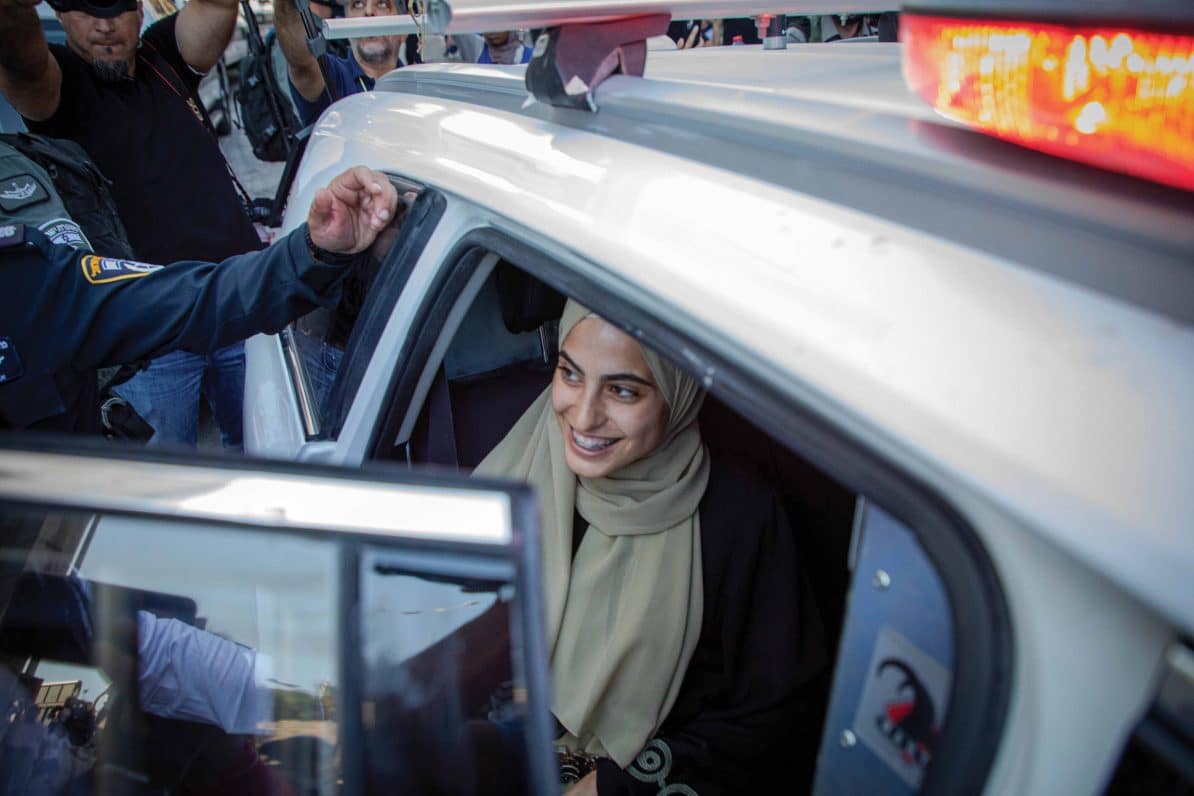
Muna el Kurd smiles while being detained by Israeli police, 6th June 2021. Photo: Eyad Tawil/Anadolu Agency via Getty Images
20th May 2021 (Taken from: #43)
This is the first interview in a six-part series. See the other interviews here.
For years a land dispute has been simmering in Sheikh Jarrah, a predominantly Arab neighbourhood in Israeli-occupied East Jerusalem. Right-wing settler groups have been trying to evict Arab families, a struggle which gained global coverage in early 2021, further heightening tensions between the two sides. In May 2021 an Israeli supreme court judgement approached that could finally seal the Arab residents’ fate.
Muna el Kurd
Palestinian activist and Sheikh Jarrah resident
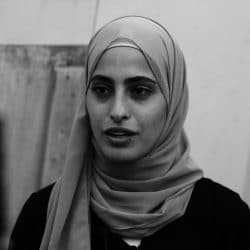
For as long as she can remember Muna el Kurd has had to battle to prove she has the right to live in her own home. “At any moment my family and I, and our neighbours too, may be pushed out of our homes and end up on the streets,” she says of what has been a lifelong ordeal.
El Kurd is a 23-year-old Palestinian resident of Sheikh Jarrah in East Jerusalem. It is a neighbourhood that, like many others in this divided city, has been contested between Jews and Arabs for decades. Since 2001 several Palestinian families have been evicted from their homes as cases brought by right-wing American-Israeli settler organisations – who say that Jews have original claims to the properties going back to the 1890s – make their way through the Israeli legal system.
In 1956, 28 Palestinian refugee families settled in Sheikh Jarrah after being forcibly displaced from their homes in Jaffa and Haifa when Israel was founded in 1948. For Palestinians the mass displacement that followed is known as Al Nakba, “the catastrophe”. At the time the West Bank and East Jerusalem were under Jordanian rule; the families reached an agreement with the United Nations and the Jordanian authorities to be resettled in newly built housing units in Sheikh Jarrah, with the families paying a symbolic fee to the Jordanian authorities. Ownership of their new homes, the families believed, would eventually be passed to them.
However, after the 1967 Six-Day War, which ended with Israel occupying the West Bank and the eastern half of Jerusalem, a new legal battle over who actually owned the land in various neighbourhoods in East Jerusalem began. Settler groups were able to take advantage of land laws – which give Jews the right to reclaim property lost before 1948 (when Jordan took control of East Jerusalem) but do not give Arabs the same right to reclaim property in Israel – hoping to change the composition of the area one family at a time.
Even though the settlers’ claims are not recognised under international law, Palestinians rarely win these cases in Israeli courts. In November 2008, the el Kurd family was evicted from half of their home. In August 2009 the Hanun and al Ghawi families were evicted from their properties. Settlers moved in after the evictions, and Israeli flags were raised on the roofs. To date, 12 Palestinian families in Sheikh Jarrah have received eviction orders issued by Israel’s magistrate and district courts. More recently, four families appealed to the supreme court – the highest judicial body in Israel – against the orders. A final judgement was expected on 10th May this year. Few had any hope that the Palestinian families would be allowed to stay.
Muna el Kurd began documenting her family’s struggles on social media in early March using the hashtag #SaveSheikhJarrah. “The idea for the campaign came spontaneously,” she explains.
“It came after we had knocked on all government, human rights and international doors, and we hadn’t received a positive response.”
I never thought that there would be such a global interaction with the campaign”
Muna, alongside her twin brother Mohammed, began live-streaming their family’s daily life in the neighbourhood, which often included clashes in the streets with settlers and Israeli police. She has amassed 1.6 million followers, including Democratic US congresswoman Alexandria Ocasio-Cortez. “I never thought there would be such a global interaction with the campaign,” she says. “The position I have been placed in is a huge burden and responsibility.”
For many of their supporters, the twins’ campaign encapsulated the struggles of Palestinians. “[I] hoped it would receive the needed resonance, and that people would know what’s taking place in this Jerusalem neighbourhood,” says el Kurd.
Activists around the world amplified the hashtag and the el Kurds’ videos. One video Muna posted in early May, in which she confronted the settler from Long Island who now lives in what was once part of her family’s home, went viral on social media.
The Israeli government appeared unsure how to respond to a grassroots social media campaign that had seized hold of the narrative. As the 10th May supreme court decision approached, and as Ramadan neared its end, Palestinian groups gathered in Sheikh Jarrah, hosting nightly meals outside el Kurd’s house to celebrate the end of that day’s fasting and to show solidarity. Rival Jewish groups also set up camp in the area and fighting between the two broke out on 6th May. Israeli police cleared the riots with tear gas and sprayed Palestinian homes with so-called ‘skunk water’, a putrid-smelling liquid frequently used by the Israeli authorities for crowd-control purposes.
In such a febrile atmosphere the supreme court hearing on the Sheikh Jarrah appeals was postponed on 9th May. “I can’t be rosy in my expectations, or to say that we’re dealing with a just entity,” says el Kurd of the court case, claiming that Israel “does not want any Palestinian Arab presence in all of Palestine, not just in Jerusalem”. El Kurd believes that social media has had the effect of “putting global pressure on governments, which in turn can put pressure on Israel” in cases where the courts have failed.
The supreme court postponement helped to galvanise Palestinian solidarity protests in Berlin, London and Toronto. “We have hope,” says el Kurd of the events. “The whole world has risen up [in support], and people in many capitals have taken to the streets to say: ‘Enough, we do not want a new Nakba. Enough occupation and colonialism.’”
Slow Journalism in your inbox, plus infographics, offers and more: sign up for the free DG newsletter. Sign me up
Thanks for signing up.
